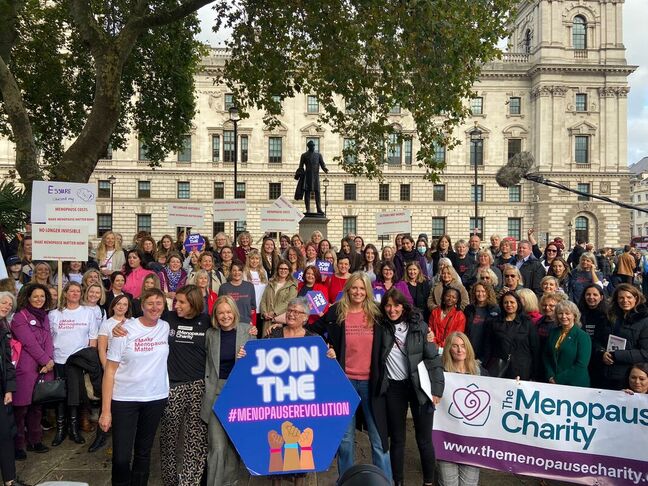|
On Friday, the Menopause Bill was debated in Parliament and some huge steps forward were made. I had a speech prepared but I didn't get chance to make it. Instead, I have written it here: I’d like to thank my honourable friend for Swansea East (Carolyn Harris MP) for bringing forward this Bill, and opening up a subject that for far too long has been taboo. Around 13 million women in the UK are currently peri and post menopausal, and the fact that we are only just starting to talk about it openly is quite frankly unbelievable.
This “hormonal turbulence” as Mariella Frostrup called it in an article this weekend, affects half the world’s population, but we are in a position where there is much misconception and misinformation about how it affects women both physically and psychologically. Symptoms that women face aren’t just limited to hot flushes and mood swings, but that is what most people associate with it. It’s much more complicated than that with a huge array of issues connected. I haven’t been feeling too great recently, but we always put our tiredness or sweatiness down to other factors, busy life and job and one of the ways I cope with it all, is to try and factor it into my day, knowing I have an early morning or a late night, making sure that my alarm is set even earlier, that I have remembered to put on my eye cream and that I have the appropriate clothing for a long day. Having to deal with the physical symptoms of the menopause, I can at least try to manage but the emotional side of it can really hit you like a ten tonne bus at any time. That’s the ‘hormonal turbulence’ which is so hard to deal with. In the summer of 2020 after a number of tests and conversations with the GP I started HRT, it did take away some of the symptoms but it also gave me others which weren’t welcome either. This is a journey, HRT may or may not be what you need but we do need to work our way through it and have the information, the conversations with the medical profession and a way forward. What worries me is that the brain fog can be really embarrassing, it takes away your confidence to speak up when as an MP, you are needed to do just that. I have to scribble notes, write down names and make light of the situation when I can’t remember a name or a word for the most simple of things. I do worry about dementia too, like many women I worry when the brain fog hits. My father’s sisters all had a form of dementia, and I know I follow in my father’s family line, so I am very keen to know the work going on in research to link the menopause with dementia. Alzheimer’s Research UK estimate that 61% of people living with dementia are women, this can’t be any coincidence. It is such an emotional day today, my honourable friend for Leicester West has really brought home to me the journey we are all on, having just turned 50 this month, I am a great believer that 50 is the new 21, we just need to talk about the menopause more and get the help and support that all women need. When I got dressed this morning, I took out a piece of jewellery that my fellow menopausal friends and former teaching colleagues had bought for my birthday, a necklace which is called Warrior from a wonderful woman called Gill Clement in Mumbles. I felt it appropriate for my friends and for all us menopause warriors to wear it today in the chamber. And I fully support my honourable friends call for Hormone Replacement Therapy to be free to women in England. As a resident in Wales my treatment will be provided free of charge thanks to the policies of the Welsh Labour Government, and I would strongly urge colleagues on the Government benches to make sure that once again it isn’t women who feel the brunt of their policies. Menopause typically happens between 47 and 53 years old, as happened for me. But it can also hit at any time, and often with devastating consequences for younger women. Around 5% of the population are affected by natural early menopause, before the age of 45. Much better understanding of the symptoms of menopause is needed from doctors and other health professionals to make sure that these younger women are also supported through what could see the end of their hopes of getting pregnant and could lead to lifelong physical and mental health issues. At this point I’d like to recognise the work that the Daisy Network do in supporting young women who go through early menopause for whatever reason. They are a volunteer network and provide support and information as well as raising awareness of the condition among GPs. I’d also like to pay tribute to the wonderful women that work for me, for the tears that were shed in the preparation of this speech and for the determination to not let the menopause get the better of us all. This is such an important issue for women and for society as a whole, and as my honourable friend has already said the menopause revolution is here and we’re ready to fight. Comments are closed.
|
News Archive
May 2024
Categories
All
|
